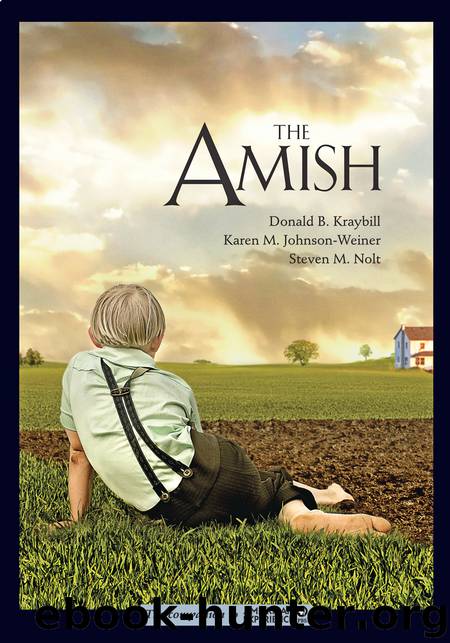The Amish by Donald B. Kraybill

Author:Donald B. Kraybill
Language: eng
Format: epub
Publisher: Johns Hopkins University Press
Published: 2013-08-28T04:00:00+00:00
The Outcomes of Amish Schooling
Academic
Evidence from testing of students in Iowa and northern Indiana shows that eighth grade pupils in Amish schools in progressive communities scored more than one grade level above the national standard on the Iowa Tests of Basic Skills. These tests measure basic skills from third to eighth grade, including reading (vocabulary and comprehension), language (word analysis, spelling, capitalization, punctuation, and usage), and mathematics (concepts, problems, and computations). A composite score measures student performance for comparative purposes. Amish third and fourth graders scored slightly below the national average, but fourth graders began to match the standard and eighth graders exceeded it. (See tables 14.1 and 14.2 for details.)33 This evidence suggests that Amish school students in higher communities are proficient in reading and writing English, and in basic math skills. There is no available evidence that indicates the skill levels of students in the most traditional Amish schools.
Are comparisons with national standards important? They are based on the assumption that if Amish pupils do not measure up to English pupils, the Amish school system is inferior. An Amish educational committee in northern Indiana thinks the standardized tests are helpful to “reveal our weak spots and point out [what] we need to work on.”34 “If somehow in the future, through negligence on our part, another school case [such as Yoder] should develop, which could well be expected, then we might lose all that we have struggled and worked for in the last fifty-five years. Therefore, our goal should be striving for improvement.”35
Amish schools do not teach basic science or technology. Instead, most emphasize an appreciation for nature within a worldview of divine creation. An Amish farmer said, “They tell me that in college you have to pull everything apart, analyze it, and try to build it up from a scientific standpoint. That runs counter to what we’ve been taught on mother’s knee” (emphasis added). Amish schools do not teach critical and reflective thinking skills aimed at developing individual autonomy. Teachers do not intentionally suppress independent thought nor do they cultivate or privilege it. Abstract and analytical modes of thought are not encouraged because they would breed impatience with the slow pace of Amish life and erode the authority of tradition.
There certainly are Amish students who, at their own initiative, pursue intellectually challenging questions, but Amish schools do not promote such traits in their curriculum or ethos. Intellectual curiosity is especially threatening in the more traditional groups. Some Amish students who pursue academic interests become self-taught scholars within their communities, while others leave the community for greater intellectual freedom.
Table 14.1. Scores of Iowa Amish Students on the Iowa Tests of Basic Skills in 2009
Download
This site does not store any files on its server. We only index and link to content provided by other sites. Please contact the content providers to delete copyright contents if any and email us, we'll remove relevant links or contents immediately.
Under the Banner of Heaven: A Story of Violent Faith by Jon Krakauer(1807)
The Early Centuries - Byzantium 01 by John Julius Norwich(1745)
The Amish by Steven M. Nolt(1574)
Taken by J. C. Owens(1561)
In Spirit and Truth (In Spiritu Et Veritate Series) by Reed Zoe(1552)
Play It as It Lays by Joan Didion(1509)
The Apogee - Byzantium 02 by John Julius Norwich(1454)
The Last Man in Russia by Oliver Bullough(1399)
A History of the Amish by Steven M. Nolt(1293)
David Sedaris Diaries by David Sedaris(1292)
The Dance of Change by unknow(1260)
Leaving the Witness by Amber Scorah(1252)
Fallen by unknow(1214)
Tears of the Silenced: A True Crime and an American Tragedy; Severe Child Abuse and Leaving the Amish by Misty Griffin(1203)
The Angel of Forest Hill by Cindy Woodsmall(1156)
Deep Blue by unknow(1147)
The Best of Amish Cooking by Phyllis Pellman Good(1143)
The Ariana Trilogy by Rachel Ann Nunes(1127)
Escape by Carolyn Jessop & Laura Palmer(1121)
